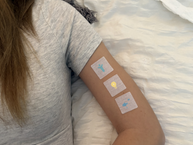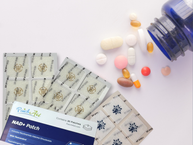Memory can often become worse during aging. There is often a genetic component, but brain health is something you can work at, too. Lifestyle choices, such as eating healthy, being physically active, and quitting smoking if you’re a smoker, are necessary for optimal brain health.
Vitamin D is a vitamin that is necessary for a healthy brain. Evidence seems to show that a vitamin D deficiency is linked to memory loss. Are you at risk for deficiency? Vitamin D Topical Patches by PatchAid offer an easy way to get your vitamin D. Just ask your doctor if it might be right for you! Here’s the information.
Background on Memory Loss
Memory loss is common. It may affect about a quarter of older adults, though estimates vary widely. Estimates may be higher if you count things like not being able to find your car keys, forgetting names of people even though you remember their names, or needing to check your personal calendar to remember which appointments you have on a given day.
These can become more common with aging, but you can help prevent them, or slow the progression, with healthy brain choices. For example, you can exercise your brain by playing memory games, attending a class, or taking different routes than usual. Exercising and avoiding smoking and excessive alcohol consumption also support brain health.
Memory loss can also be a sign of a more serious condition. It might be an indicator of dementia, or it could be a sign of Alzheimer’s disease, for example. Alzheimer’s disease affects more than 6 million Americans.
Vitamin D and Brain Function
Vitamin D has wide-ranging functions in the body. It may be best known for its role in bone health, since it helps the body absorb and use calcium. But it has many other functions. Vitamin D is involved in the following.
- Supporting cell differentiation to create normal cells.
- Promoting normal immune function and preventing autoimmune conditions.
- Promoting normal insulin secretion for glucose regulation.
- Allowing for normal blood pressure regulation.
Vitamin D is also related to neurocognitive health. That may be due in part to regulating calcium channels in the brain. Other reasons may have to do with vitamin D’s role in hormone production and regulation, as well as vitamin D’s role in maintaining healthy blood pressure. If you’re not getting proper blood flow to your brain, it makes sense that your brain might not keep working as well.
Vitamin D and Memory Loss
There’s reason to believe that vitamin D deficiency can play a role in memory loss. Numerous studies have looked into possible links between low vitamin D levels and loss of memory or cognitive decline. It’s important to note, though, that cause and effect hasn’t been proven. These aren’t clinical trials. Instead, they’re observational studies that can show an associated between low vitamin D and memory deficits.
Low vitamin D has already been linked to a variety of brain-related conditions, such as the following.
- Increased risk for Alzheimer’s disease.
- Increased risk for cognitive impairment.
- Increased risk for Parkinson’s disease.
Babies born with low vitamin D levels are more likely to eventually develop schizophrenia, which is a disorder of the brain. More evidence suggests a role of vitamin D in getting brain function back after a heart attack, since people with adequate vitamin D appear more likely to recover fully.
What about the most common type of memory loss, which is memory loss, as part of cognitive decline, as we get older? It turns out that vitamin D is also linked to this area. As they age, people with low vitamin D are more likely to develop trouble with memory related to higher-level skills that are used in communication. These can include remembering numbers and words.
Should you take vitamin D to improve memory? It hasn’t been proven that taking vitamin D can improve memory, but it is likely that low vitamin D can be harmful to memory. If you’re concerned, ask your doctor whether you should take a supplement, such as a PatchAid Vitamin D patch.
Who’s at Risk for Vitamin D Deficiency?
Are you getting enough vitamin D? It’s possible you aren’t. These are some risk factors for being low in vitamin D.
- Having dark skin.
- Covering skin or always wearing sunscreen when out in the sun.
- Not drinking milk regularly.
- Living in a northern climate where sunlight is not intense in winter months.
- Being overweight or obese.
- Being a bariatric surgery patient.
- Having a malabsorptive disorder.
Prevalence of deficiency is high, with about 2 in 5 adults having suboptimal levels of vitamin D. Even if you’re not in one of those groups, you could be low in vitamin D.
Testing for Vitamin D Deficiency
It’s easy to test vitamin D levels. All it takes is a blood test that most labs offer. Your doctor can order a vitamin D test. You don’t have to be fasting when you go for your test, and it doesn’t matter what time of day it is when you take the test. You should get the results back within a few days or weeks, and then you can know how your vitamin D status is.
Sources of Vitamin D
Some people can make enough vitamin D when they get exposure to the sun. That’s because radiation from the sun triggers a process that starts in your skin. It helps turn precursors of vitamin D into forms that are closer to the active form. Your liver and kidneys complete the process.
To get enough vitamin D from the sun, the following need to be true.
- You are young enough, since older adults have less of an ability to produce vitamin D.
- You live in a region with enough radiation year-round. Northern climates don’t have sunlight that is intense enough to produce sufficient vitamin D in the winter months.
- You don’t wear sunscreen or protective clothing all the time when you’re in the sun.
You can also get vitamin D from foods, though not from that many foods. Vitamin D is not naturally found in many foods. It is in fatty fish, such as mackerel, salmon, and sardines. It is also in egg yolks. Vitamin D may also be in fortified milk and milk substitutes, irradiated mushrooms, and fortified cereal and orange juice.
Vitamin D Patches and Memory
Taking vitamin D supplements can boost vitamin D levels, but which is right for you? It’s best to ask your healthcare provider about the right one for you, but there are a few advantages to Vitamin D3 Topical Patches by PatchAid compared to taking oral supplements, such as capsules or liquid vitamin D.
- It’s easier to use a patch than to swallow a pill if you have a sore esophagus, such as after surgery, or if you just don’t like swallowing whole capsules.
- Liquid droplets may not taste that good.
- You don’t have to worry about absorbing vitamin D in the digestive system with a patch. That’s good if you tend to have a sensitive stomach or you have a malabsorptive disorder.
Vitamin D3 Patches by PatchAid also come with calcium. The Vitamin D3 with K2 Patch includes vitamin K, which is essential for healthy blood and bones.* The Vitamin D3/Calcium patch not only has calcium, but also magnesium, which is necessary for strong bones and normal nerve function.*
The Multivitamin Plus Patch with or without Iron also has vitamin D.
Other Vitamins for Memory Loss
Vitamin D isn’t the only vitamin that’s needed for a healthy brain. Other vitamins, minerals, and other nutrients are also essential to keep the brain healthy. Omega-3 fatty acids are part of healthy brain cells.* The Omega-3 Plus Patch is rich in them.
B vitamins are needed for metabolism, and that includes in the brain. The B12 Energy Plus Vitamin Patch by PatchAid has vitamin B12, which is linked to normal mood, and a range of other B vitamins for normal metabolism and energy production.*
Antioxidants are compounds that fight compounds called free radicals. Free radicals can react with your cells and cause damage. Antioxidants help prevent these harmful reactions from happening. The Antioxidant Vitamin Patch Pack by PatchAid has vitamin C, resveratrol, and more antioxidants.*
Vitamin D is crucial for so many things in the body, from immunity to bone health to diabetes prevention. It may also be necessary for maintaining healthy brain function, as studies suggest that people with vitamin D deficiency are more likely to experience memory loss. Ask your doctor if you might be low in vitamin D and whether a Vitamin D PatchAid Topical Patch may be right for you. Also be sure to ask your doctor before using any nutritional supplement and if you have any concerns about brain health.
*The Food and Drug Administration has not evaluated these statements. PatchAid patches are not intended to diagnose, treat, cure or prevent any disease. Anyone with a medical condition should seek the advice of a licensed medical practitioner. Individual results may vary.







